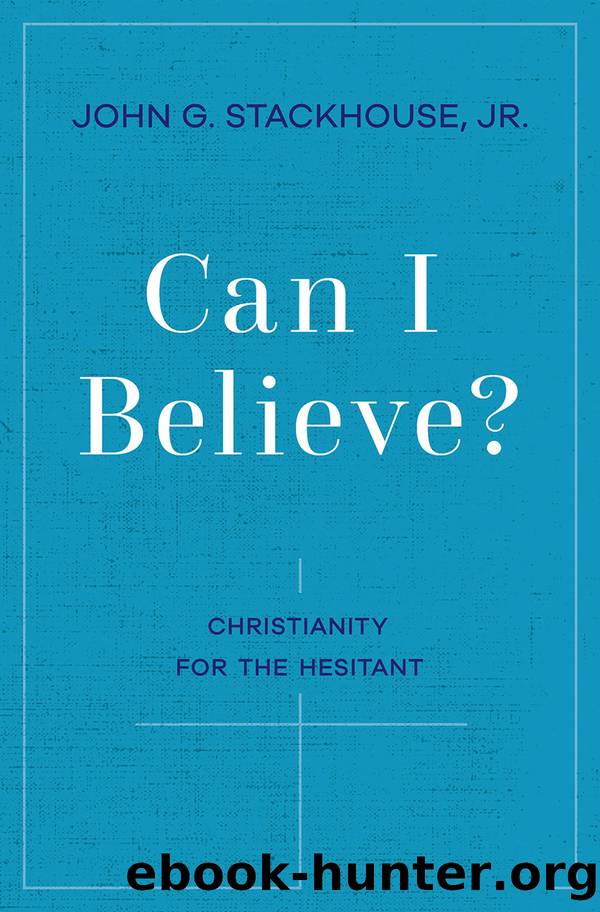Can I Believe? by John G. Stackhouse Jr

Author:John G. Stackhouse Jr.
Language: eng
Format: epub
Publisher: Oxford University Press
Published: 2020-01-15T00:00:00+00:00
Philosophical Grounds
According to Immanuel Kant, the fundamental questions any philosophy has to answer are these: âWhat can I know? What should I do? What may I hope?â (Critique of Pure Reason, 1781/1787). We might elaborate on Kantâs formulation to say that the fundamental questions that any philosophy, any functional religion, has to answer are theseâbeyond the initial epistemological question, which we have already addressed: How well does this or that religion serve as the center of human life? How well does it explain the world and our place in it? How well does it recognize our highest good? How well does it diagnose what keeps us from that good? How well does it prescribe the solution to our problems? How well does it help us reach that highest good? A religion is an explanation of, and a response to, all of lifeâfrom oneâs most private inward experiences to the nature of the entire universe. So as we weigh up various religious options, we properly ask what religion best explains it all. What religion helps the most and in every way? What religion fits life?
These are the largest possible questions, requiring the largest possible answers. The brilliant Christian writer G. K. Chesterton (1874â1936) seemed never at a loss for words. Author of many books (including biographies, theology, thrillers, and his famous Father Brown mystery stories), editor of a weekly newspaper to which he was the major contributor, wide-ranging essayist, charming poet, and tireless gadfly, words flowed from Chesterton in an apparently unstoppable flood. In only one instanceâthis instanceâdid he admit that a question had (almost) dumbfounded him:
It is very hard for a man to defend anything of which he is entirely convinced. It is comparatively easy when he is only partially convinced. He is partially convinced because he has found this or that proof of the thing, and he can expound it. But a man is not really convinced of a philosophic theory when he finds that something proves it. He is only really convinced when he finds that everything proves it. And the more converging reasons he finds pointing to this conviction, the more bewildered he is if asked suddenly to sum them up. Thus, if one asked an ordinary intelligent man, on the spur of the moment, âWhy do you prefer civilization to savagery?â he would look wildly round at object after object, and would only be able to answer vaguely, âWhy, there is that bookcase . . . and the coals in the coal-scuttle . . . and pianos . . . and policemen.â The whole case for civilization is that the case for it is complex. It has done so many things. But that very multiplicity of proof which ought to make reply overwhelming makes reply impossible. . . . There is, therefore, about all complete conviction a kind of huge helplessness.14
Download
This site does not store any files on its server. We only index and link to content provided by other sites. Please contact the content providers to delete copyright contents if any and email us, we'll remove relevant links or contents immediately.
The Hatha Yoga Pradipika (Translated) by Svatmarama(2498)
Real Sex by Lauren F. Winner(2481)
The Holy Spirit by Billy Graham(2427)
The Secret Power of Speaking God's Word by Joyce Meyer(2258)
The Gnostic Gospels by Pagels Elaine(2034)
Devil, The by Almond Philip C(1906)
23:27 by H. L. Roberts(1895)
Jesus by Paul Johnson(1892)
The Nativity by Geza Vermes(1853)
All Things New by John Eldredge(1786)
Chosen by God by R. C. Sproul(1766)
Angels of God: The Bible, the Church and the Heavenly Hosts by Mike Aquilina(1630)
The Return of the Gods by Erich von Daniken(1578)
Angels by Billy Graham(1555)
Evidence of the Afterlife by Jeffrey Long(1463)
Knowing God by J.I. Packer(1436)
The Gnostic Gospel of St. Thomas by Tau Malachi(1414)
Victorian Sensation by James A. Secord(1410)
How To Be Born Again by Billy Graham(1407)
